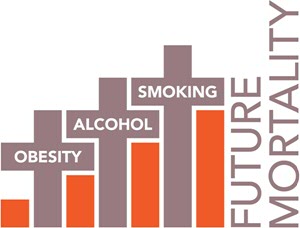Novel mortality forecasting technique results in higher future life expectancy values for Europe

Life expectancy, the average number of years people can expect to live, is an important summary measure of health. Forecasting how life expectancy will develop in the future is essential for public policy, social security, and healthcare planning. Most mortality forecasts, however, rely on a mechanical extrapolation of past mortality trends, which could easily result in unreliable outcomes because temporal fluctuations in mortality trends are generally ignored. Lifestyle factors, particularly smoking, alcohol abuse, and obesity, are important causes of temporal fluctuations in mortality trends in Europe. In the recent publication in eLife, Prof. dr. Fanny Janssen (Netherlands Interdisciplinary Demographic Institute (NIDI) and University of Groningen (UG)) and colleagues introduce a novel mortality forecasting technique which takes into account the impact of smoking, obesity and alcohol on mortality trends, and the mortality experience of forerunner populations.
Janssen et al. project that life expectancy at birth, in the 18 European countries studied, will increase from, on average, 83.4 years for women and 78.3 years for men in 2014 to 92.8 years for women and 90.5 years for men in 2065. Compared to a benchmark Lee-Carter mortality extrapolation, and the forecasts by Eurostat and the United Nations, the projection results in higher future life expectancy values, more realistic differences in future life expectancy between countries and between sexes, and additional insights into what is driving future life expectancy values. More specifically, their projected e0 values in 2065 are 5 years higher for men, and 3 to 4 years higher for women compared to the 2020 Eurostat and United Nations forecasts. The projected life expectancy values for the Netherlands in 2065 (93.2 for women; 91.1 for men) are 4.2 years (men) and 2.7 years (women) higher than those forecasted by Statistics Netherlands.
Their findings of (i) higher projected life expectancy values than those currently obtained, and (ii) of a rather steady long-term increase in life expectancy after the effects of smoking, obesity, and alcohol are controlled for, imply longer individual lifespans, more elderly in society than previously anticipated, and that a limit to human life expectancy is not within reach.
The novel approach, which distinguishes between the underlying long-term mortality decline and the remaining factors that cause deviations from this mortality decline, could be adopted as well to account for the impact of the COVID-19 pandemic on mortality and life expectancy.
The publication comprises the concluding article of the research project by Fanny Janssen entitled ‘ Smoking, alcohol, and obesity, ingredients for improved and robust mortality projections ’ (see www.futuremortality.com ) funded by the Netherlands Organisation for Scientific Research (NWO) (grant no. 452-13-001).
Source: Janssen, F., Bardoutsos, A., El Gewily, S., de Beer, J. (2021). Future life expectancy in Europe taking into account the impact of smoking, obesity and alcohol. eLife. doi: 10.7554/eLife.66590. https://elifesciences.org/articles/66590
More news
-
01 December 2025
The power of movement
-
24 November 2025
RUG en Ministerie van I&W starten brede meerjarige samenwerking
